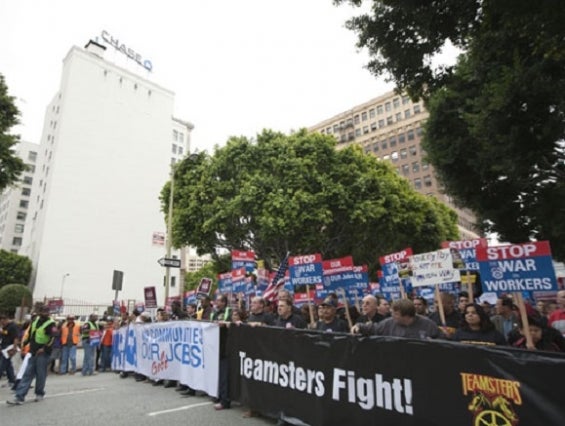Headline News
Teamsters: More Money Needed For Cities, Less For Wall Street

Income inequality has become a major topic of discussion from community groups to Capitol Hill, and rightfully so. Numerous reports have made it clear that the few are benefitting while the vast majority of people are finding it more difficult to get by, even though the last recession officially ended almost five years ago.
While the struggle continues for many, including for the long-term unemployed and food stamp recipients who have lost their benefits, other losses are more difficult to see. They may not hit the average person in their wallet daily, but they affect the quality of life for us and our neighbors. And these problems shouldn’t be ignored.
A report released this week by the Fix LA Coalition details some of those losses in the nation’s second largest city. It notes while Wall Street was at the center of the country’s economic downturn, it has rebounded and in 2013 Wall Street banks and corporations made more than $200 million in fees paid by Los Angeles taxpayers alone. Meanwhile, the city has substantially cut its budget since the recession and only spent $163 million to repair its streets in the same year.
“The Wall Street crash reduced revenues and forced a 19 percent cut in city spending on government operations and activities when measured on a per capital basis in 2014 dollars,” the report states. “Basic neighborhood services have been halted or severely curtailed.”
To get to the bottom of the situation, the report says a full accounting of payments to Wall Street banks should be required. Using that information, city officials should look to reduce fees paid to such firms so the money can be invested in infrastructure in Los Angeles. The $204 million collected by Wall Street firms last year came from the $106 billion those banks and financial institutions control citywide, much of due to tax loopholes.
As this report and many others in recent months have pointed out, there needs to be a leveling of the playing field. A healthy economy doesn’t just funnel millions to the most wealthy; it ensures that all hard-working Americans share in the gains of this nation. But that’s not happening and elected officials should do something about it.
The U.S. needs more quality middle-class jobs. It is an effort that will require the public and private sectors to work together to make infrastructure investment happen. That solution benefits all of us.